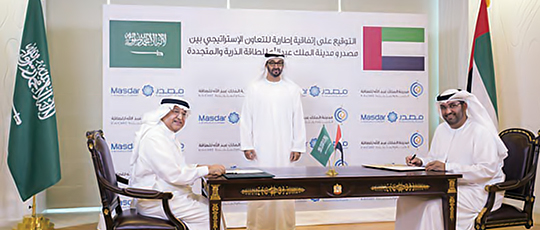2014-08-01
UAE on course to be major sustainable energy pioneer
The UAE, despite being best known for being oil-based, is embracing sustainable technologies
The UAE could be a defender of the status quo on energy use, but the country is a powerful advocate for a cleaner environment and efforts to halt climate change. The UAE proves it with a pivot of historic proportions, trying to build a oil-free future in the desert and countless other important initiatives.
The UAE has become a major player in clean technologies, funding large-scale renewable energy projects around the world, and investing millions in fundamental research (in partnership with MIT) in energy, water, microelectronics, advanced materials, and transportation systems.
The UAE is positively progressive on clean energy. At the Future of Energy Summit, UAE leaders announced a partnership with Denmark, and with Vestas Wind in particular, to tackle energy poverty in the developing world.
The Wind for Prosperity project will offer carbon-free electricity to those who mostly use very expensive diesel generators for power. This partnership is only one example of the UAE’s strategy to help bring about a clean economy future, which, according to Bader Al Lamki, the director of Masdar Clean Energy, has two major elements.
First, the country is helping build the global supply of clean energy, recognising that conventional forms of energy are going to decline. Masdar clean energy runs several couple of funds investing hundreds of millions of dollars in some of the largest utility scale solar and wind projects in the world, as well as water desalination, energy storage, and energy efficiency.
Second, UAE built Masdar City, a demonstration project and research facility, to show how clean technologies could work in practice. UAE partnered with Massachusetts Institute of Technology (MIT) to build a graduate degree programme and research facility to patent and leverage new technologies.
And the quest for a clean, green environment is not new. Decades ago, the father of the UAE, Sheikh Zayed bin Sultan Al Nahyan, laid out a vision of critical issues that would shape the future of his country. The four main ideas, according to Fred Moavenzadeh, the MIT professor running the Masdar Institute of Technology, were the diversification from oil and gas, concern about climate change, the importance of good education for his people, and equal rights for women.
UAE is certainly not alone in trying to make a fundamental pivot away from fossil fuels. There’s a surprisingly long list of countries that get over half their electricity from renewables already, although most are using hydropower to get there. A smaller group is going for the true renewables like solar, wind, and geothermal.
Germany, while struggling at times, is pursuing green energy aggressively. Kenya is planning to get half its electricity from solar by 2016. Morocco is shooting for 42 per cent renewables by 2020. Saudi Arabia has some aggressive solar goals and is investing over $100bn in a solar future.
The scale of UAE’s clean activity may not be enough to replace the oil-based economy any time soon. But it’s clear that the country is on the right track, big time.
Experts note that companies and countries of all sizes should heed the UAE example.
Saudi Initiatives
Masdar and King Abdullah City for Atomic and Renewable Energy (known as K.A.CARE) recently announced the conclusion of an agreement to work together to advance the development of renewable energy and clean technology across the region.
The accord, which comes at a time of increasing interest in renewables across the region, lays down a framework to jointly invest in clean energy projects and green technology investment funds. It will also create opportunities for collaboration on the research and development of advanced clean energy technologies, including solar, wind and water.
General Shaikh Mohammad bin Zayed Al Nahyan, Abu Dhabi Crown Prince and Deputy Supreme Commander of the UAE Armed Forces, attended the signing of the strategic framework agreement in Abu Dhabi where it was signed by Dr Sultan Ahmad Al Jaber, Minister of State, Chairman of Masdar, and Dr Hashim Abdullah Yamani, President of King Abdullah City
Shaikh Mohammad hailed the agreement and its important role in adding to the strong historic and strategic relationship between the UAE under the leadership of President His Highness Shaikh Khalifa Bin Zayed Al Nahyan and the Kingdom of Saudi Arabia.
“Increased cooperation among GCC countries is crucial to advancing security, stability and sustainable growth throughout the region,” said Shaikh Mohammad. “Energy is fundamental to all economic and social development. The enhanced cooperation between Masdar and K.A.CARE will contribute to extending the region’s energy leadership.”
Dr Al Jaber said: “Masdar shares many strategic objectives with K.A.CARE. The UAE is a pioneer in deploying renewable energy and is also a major contributor to the international deployment of clean energy.
“By sharing our knowledge and experience with K.A.CARE, we believe that, together, we can further advance the use of renewables and ensure our long-term economic and energy security.”
K.A.CARE was established in 2010 with the aim of diversifying Saudi Arabia’s energy sources, to include nuclear and renewables.
Through the agreement, Dr Yamani said, King Abdullah City for Atomic and Renewable Energy aims to diversify Saudi Arabia’s energy sources.
“We are delighted to sign this agreement with Masdar, that has a proven track record and demonstrated credible achievements during the last eight years in this emerging sector. As renewable energy solutions approach grid parity, we are confident our combined efforts will contribute to the implementation of renewable energy projects in the region and around the world,” he said.
Since its establishment in 2006, Masdar has played an increasingly important role in extending Abu Dhabi’s energy leadership beyond hydrocarbons, by adopting an integrated, holistic renewable energy business model merging higher education, research and development, investment and sustainable living. The company has deployed close to 1GW of clean energy projects in the UAE and around the world.


No Comments